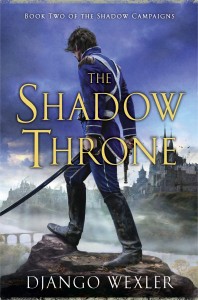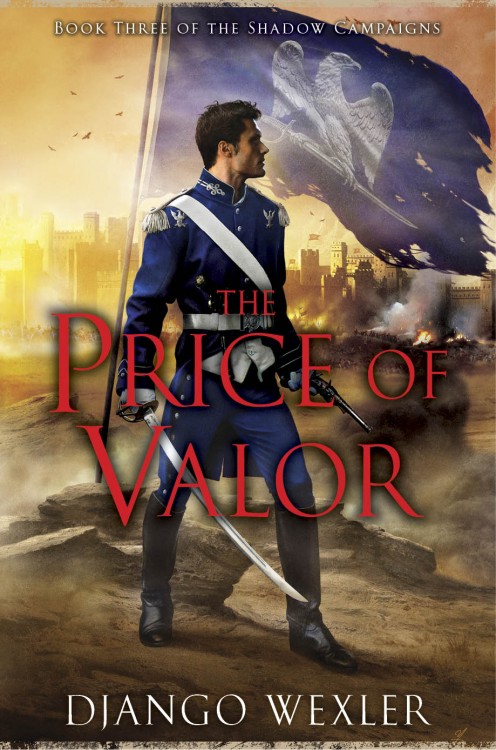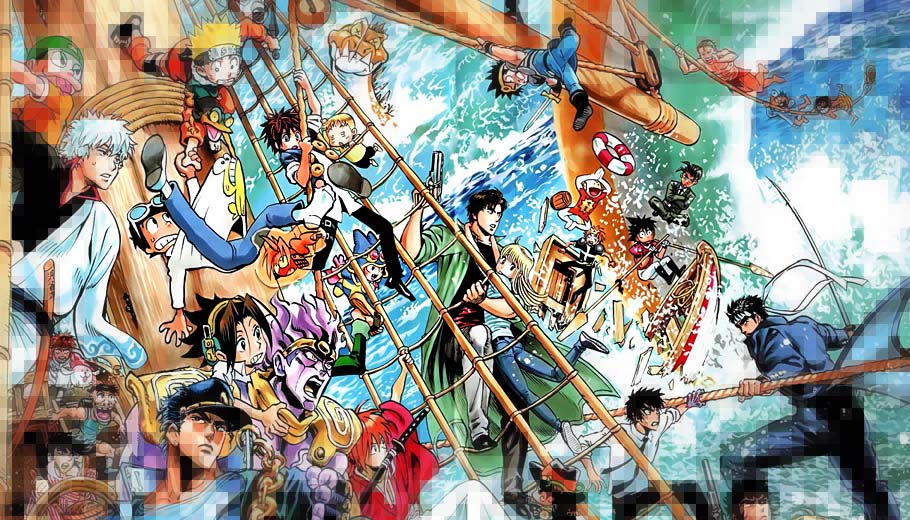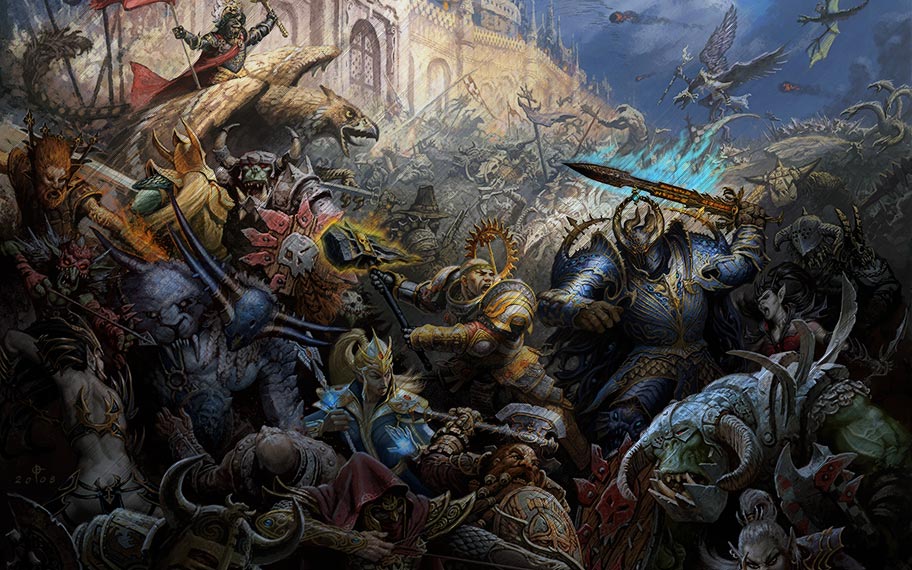Publisher: Roc -
Pages: 624 -
Buy: Book/eBook

The Shadow Throne is the second volume in Django Wexler’s ongoing Shadow Campaign series, picking up right where the events of The Thousand Names left off: with protagonists Winter Ihernglass and Marcus d’Ivoire returning home to Vordan from Khandar under the leadership of Colonel Janus bet Vhalnich, there to continue the latter’s secret campaign against the sinister Duke Orlanko. It’s a flintlock fantasy series, full of secret magic, roaring battles and deadly politics: excellently written, superbly paced and all-round good fun. The Thousand Names was so polished, I had trouble believing it was Wexler’s first novel, and The Shadow Throne only improves from there, the shift in setting from foreign desert to home city managed with aplomb. Wexler is a master at writing battles, tactics and political intrigue with just the right level of detail: everything feels believable and, even more impressively, cunning, and despite the change in location between the two books, the consistent characterisation and martial focus means it never feels like we’ve leapt genres. Read More »

In the wake of the King’s death, war has come to Vordan.
The Deputies-General has precarious control of the city, but it is led by a zealot who sees traitors in every shadow. Executions have become a grim public spectacle. The new queen, Raesinia Orboan, finds herself nearly powerless as the government tightens its grip and assassins threaten her life. But she did not help free the country from one sort of tyranny to see it fall into another. Placing her trust with the steadfast soldier Marcus D’Ivoire, she sets out to turn the tide of history.
As the hidden hand of the Sworn Church brings all the powers of the continent to war against Vordan, the enigmatic and brilliant general Janus bet Vhalnich offers a path to victory. Winter Ihernglass, newly promoted to command a regiment, has reunited with her lover and her friends, only to face the prospect of leading them into bloody battle.
And the enemy is not just armed with muskets and cannon. Dark priests of an ancient order, wielding forbidden magic, have infiltrated Vordan to stop Janus by whatever means necessary…
Price of Valor is the third volume of Wexler’s Shadow Campaigns series, which has been popular among readers and critics alike. Reminiscent of the Orbit Books’ covers for Brian McClellan’s Powder Mage series, the covers of all three novels embrace the themes of colonialism that run through Wexler’s series.
As a proper English-speaking blogger, I am, of course, upset that they forgot the ‘U’ in the word ‘Valour,’ but I shall let it slide, forgiving the transgression as a result of the overall Ammmmuuurrriccaaannnaaaa design of the cover. And so, as a cold-blooded Canadian, I’d have much preferred to see the Eagle on the flag replaced with a piece of bacon, the sabre with a wood axe, and the military uniform tossed aside in favour of a nice Canadian Tuxedo. ‘Cause, hey, there can never be enough Canadiana in the world, right?
The cover art for The Price of Valor is by Paul Youll.
Price of Valor is coming from Roc Books in July, 2015.
I’ve read an awful lot of fantasy, and watched an awful lot of anime, and both canvases are incredibly broad and notoriously hard to characterize.
When first discussing this essay, comparing and contrasting the traditional hero narrative in fantasy fiction and anime, with my friend Casey Blair, I found myself in a bit of difficulty. I’ve read an awful lot of fantasy, and watched an awful lot of anime, and both canvases are incredibly broad and notoriously hard to characterize.
Fantasy, after all, includes classics like Lord of the Rings, heroic secondary-world epics like The Wheel of Time, wainscot fantasy like Harry Potter, and the magical realism of The City & The City, covering sub-genres like urban fantasy and steampunk in between. It’s very hard to write a coherent comparison that covers both C.S. Lewis’ The Chronicles of Narnia and Max Gladstone’s Three Parts Dead, for all that we shelve them in the same genre.
Similarly, anime is unbelievably diverse, more so than all but the most hardcore of fans realize. (Because the US translation companies skim the cream of the crop, picking the hit shows and often passing over the stuff with less broad appeal.) From staples like Dragonball, Sailor Moon, or Naruto, anime goes all the way to Revolutionary Girl Utena (which is so symbolic as to be almost abstract) and Non Non Biyori (which is about a bunch of girls in a rural village chatting about nothing in particular). It includes every genre of speculative fiction we have in the US, and some we don’t. Read More »
Starting with Tolkien, it’s become practically obligatory that the epic fantasy saga, somewhere around the middle of book three, feature an Epic Confrontation Between Good and Evil with a Cast of Thousands.
I am, I have to admit, a war buff. I read military histories for fun, the kind with fold-out maps covered in little colored arrows and notations like “Kollowrath (40,000)”. As I am also a fantasy novelist, the nature of war in fantasy fiction has always been fascinating to me.
And there is a lot of war in fantasy. Starting with Tolkien, it’s become practically obligatory that the epic fantasy saga, somewhere around the middle of book three, feature an Epic Confrontation Between Good and Evil with a Cast of Thousands. Various allies, painfully recruited over the course of the hero’s journey, turn up to lend a hand at the Final Battle. Various villains are dispatched, hapless orcs or equivalent humanoids are mowed down by the score, and just when things seem bleakest Evil is defeated forever. A beloved secondary character or two bites the dust, and someone gets to make a Heroic Sacrifice. Afterward, we may be treated to a scene where the hero roams a battlefield strewn with corpses, or visits the injured to bring home the horrors of combat. You know, war, right?
Back before I wrote fantasy myself, my wargamer friends and I used to snicker a bit at this. Most of the fantasy authors wouldn’t know a halberd from a half-pike, and their descriptions of battles were usually heavy on bold strokes and dramatic confrontations and light on tactics and the important of proper reconnaissance. I wouldn’t want to be a poor foot-slogger in either army, given the rate at which they tend to be chewed up by either the hero and his friends or some villain demonstrating the full extent of his power. Read More »




